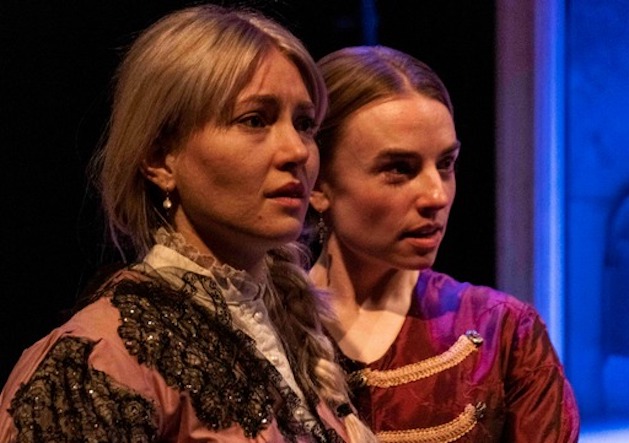
Powerhouse actors: Lola Clair as Thea and Hayley Sullivan as Hedda
(Photo: Nancy Caldwell)
Hedda Gabler rides the tension between realism and melodrama. This United Players production gets that combo right enough of the time to provide a consistently intriguing, often impressive evening.
Playwright Henrik Ibsen is known as the father of theatrical realism and, to a degree, that makes sense when you look at Hedda Gabler: the title character’s psychology is complex and her story is firmly rooted in the social realities of her time and place (late nineteenth-century Norway). But Hedda Gabler is driven by so many plot twists and so much high-stakes scheming and shock that it’s also a potboiler. (Think Succession but with more taffeta.)
In the story, Hedda and her academic husband Jorgen Tesman have just returned from a six-month honeymoon and Hedda is already trying to kick the boards out of the stall of her bourgeois marriage. Tesman can’t provide the lifestyle to which she feels entitled as the daughter of a famous general, and he’s boring her to death. (To be fair, left to her own devices, Hedda does a great job of doing that on her own: she admits that boredom is her only real talent.)
Complications arrive in the form of family friend Judge Brack, who offers Hedda a romantic triangle with himself as the only stud on the farm, and Tesman’s long-time academic rival Ejlert Lovborg, an alcoholic who has gotten sober and published a best-selling book of history, which puts him in the perfect position to grab the job upon which Tesman has banked his future. Then there’s Thea Elvsted, Lovborg’s lover and literary collaborator. Hedda once had the opportunity to be Lovborg’s partner, but she was too afraid of impropriety. And she’s the jealous type so …
The fuel for this story comes from the combustion that takes place when the constrictions of Hedda’s role as a woman meet her blind selfishness, entitlement, and social conservatism, which all prevent her from finding the agency that might allow her to make more room for herself. Embittered and nihilistic, she sets her sights on controlling the fates of others. She’s an antihero, fucked up and dangerous.
Playing Hedda, Hayley Sullivan is at her best in the moments in which Hedda is suddenly aware that she’s behaving cruelly, but can’t stop herself. She has no idea why she’s such a demon. Horror freezes her face.
Under Moya O’Connell’s direction Sullivan inhabits the more operatic reaches of Ibsen’s writing. With her Hedda, the machinations are big and clear, but they’re also complex, responsive and evolving, which makes them incredibly watchable.
Lola Claire (Thea) and Nick Rempel (Brack) perform in a more realistic mode. Embodying a good deal of deep emotion, Claire masterfully guides our shift in perception of Thea: the character starts off looking like a fool but is, in fact, intellectually and emotionally substantial, the woman Hedda would be if she had any real courage. And, in one of the most relaxed and impressive performances of the evening, Rempel makes Brack’s sleaziness charming.
Playing Lovborg, Victor Ayala is functioning in a similar dimension: his portrait is contained, but I believed its passions.
Within the major characterizations, Ayush Chhabra, who’s playing Hedda’s husband Tesman, has the most difficulty. Chhabra is a talented guy. I loved his work in Amphitruo in 2021. Here, though, he delivers a mannered performance, especially in the early going. He indulges in a lot of fussy business, for instance, constantly shuffling papers and books with no clear intention. It feels like he’s telling us something about the character, as opposed to inhabiting him. That said, Chhabra’s work becomes more grounded as the evening progresses and, as it simplifies, it becomes more moving.
The raised platform at the back of Emily Dotson’s set is awkward and I’m not a fan of Torquil Campbell’s bold sound design, but many of Judy White’s costumes are gorgeous. I’m thinking of Hedda’s claret-coloured gown, for instance, which, in a nod to Hedda’s father, features gold military braiding on the bodice.
The stylistic inconsistencies of this production are, ultimately, director O’Connell’s responsibility. But so are the overall integrity and intelligence of this mounting. Hedda Gabler is a huge and fascinating play, and this is a stimulating production.
HEDDA GABLER by Henrik Ibsen. Translated and adapted by Errol Durbach. Directed by Moya O’Connell. A United Players production at the Jericho Arts Centre on Friday, March 30. Running until April 16. Tickets
NEVER MISS A REVIEW: Sign up for FRESH SHEET, my weekly e-letter about the arts.
And, if you want to help to keep independent arts criticism alive in Vancouver, check out my Patreon page.





0 Comments